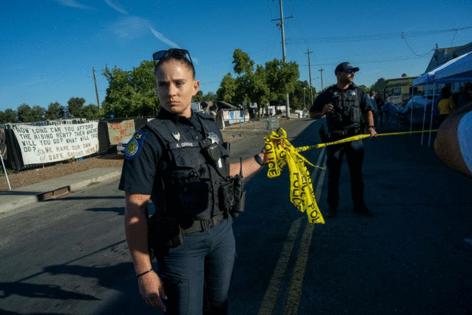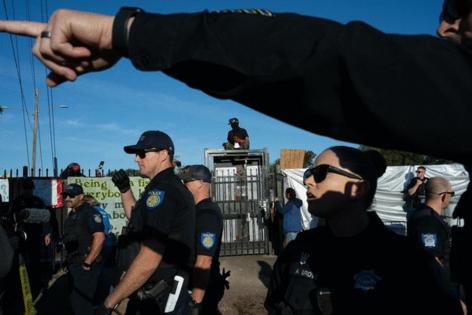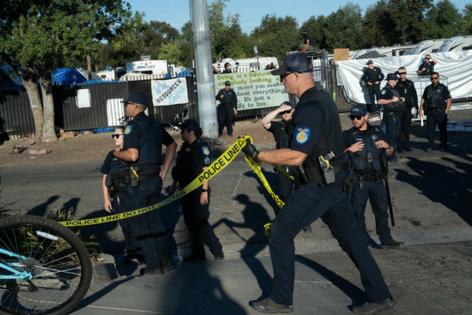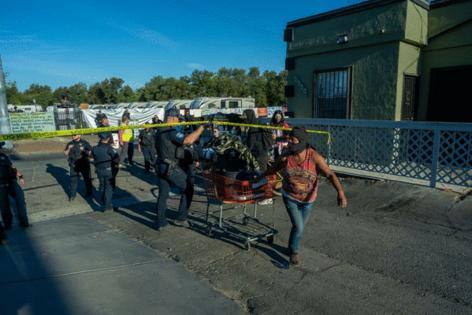Police blocked journalists from getting close to Sacramento homeless sweep. Was it legal?
Published in News & Features
SACRAMENTO, Calif. -- The city of Sacramento might have violated state law when it blocked journalists from entering the entire block where it was clearing a homeless camp Monday.
Unlike other times officers have cleared camps, when officers arrived Monday morning to shut down Camp Resolution in North Sacramento, it directed all media and members of the public to stand behind police tape, 200 feet from the camp’s entrance.
When a Sacramento Bee reporter and photojournalist walked past the tape, officers within seconds ordered them to walk back behind the tape or risk arrest.
“If you’re obstructing police then yes you are subject to arrest under 148(a)(1) Penal Code,” Sacramento police Officer Nicholas Raleigh said.
That state law Raleigh referenced states, “Every person who willfully resists, delays, or obstructs any public officer, peace officer, or an emergency medical technician ... in the discharge or attempt to discharge any duty of his or her office or employment, when no other punishment is prescribed, shall be punished by a fine not exceeding one thousand dollars ($1,000), or by imprisonment in a county jail.”
When the journalists said they would not interfere with the operation, the officers again ordered them to walk back behind the tape.
David Loy, attorney for the First Amendment Coalition, said it appears the city may have violated state law by severely restricting media access to the camp.
“I have very substantial concerns this violates the First Amendment,” Loy said. “The press and public have the right to record police from a reasonable distance. They cannot interfere with operations but they have a right to observe. This sounds like an excessive restriction on the right to record and cover police activities ... I don’t see how they can close off an entire block.”
Police often cordon off crime scenes such as shootings or stabbings to keep members of the media out, which is allowed because they have to protect the integrity of their investigation, Loy said.
Sacramento police do not typically do so for a homeless sweep, however.
Aaron Field, a First Amendment lawyer who represents The Sacramento Bee, agreed with Loy that it appeared the police had violated state law.
“The city cannot prevent journalists from covering its camp-clearing efforts from out of the way, public places for no good reason,” Field said. “However, that is unfortunately what appears to have happened here.”
Spokespeople for the city and its police department did not immediately respond to emails seeking comment.
In addition to state law, the action also appears to violate the Sacramento Police Department’s media relations policy.
“Media representatives may enter a closed disaster scene at their own risk if they do not ‘impede’ emergency personnel in the performance of their duties,” the policy states. “When an area is closed, media representatives will be accommodated with whatever limited access to the sites may be afforded without material and undue interference to emergency personnel.”
Sacramento Bee photojournalist Renée C. Byer, a Pulitzer Prize winner, has visited the camp of disabled seniors dozens of times since it opened in 2022. She had been there for hours before police arrived and ordered her behind the line.
“I identified myself to police, who I was working for and said I’ve been working on this story for two years,” Byer said. “I can’t get back those missed vital images of the police storming the gate from the area I should have been allowed access and was told I had to leave earlier that morning ... I was in no way impeding on their work and never have in my 40 years as a trusted renown photojournalist.”
The camp residents largely decided to vacate the property peacefully. But it could have been a massive standoff with uses of force and arrests. That’s what happened in 2019 when the Sheriff’s Office cleared a lot on Stockton Boulevard, where members of the media were restricted from the area with crime tape.
Later Monday, police detained and cited four people, who weren’t media, for what police have described as “resisting/obstructing/delaying.”
Camp Resolution came to be after The Sacramento Bee reported the city had payed $617,0000 to pave and fence a city lot for a homeless shelter that never opened. A handful of homeless women broke in and started camping on the lot. Instead of clearing them off the property, as the city had in the past, the city got on board. It signed a lease with Safe Ground Sacramento, a nonprofit run by civil rights attorney Mark Merin, which was running a Safe Ground at 12th and C streets. It dropped off trailers from the state that had been sitting empty, for guests to use. Unlike other shelters, which cost several million dollars a year to run, the site did not cost the city anything.
Due to vapor contamination, a state agency allowed people to live at the site in trailers, but not in tents on the ground. The type of contamination that’s present is not harmful to people in vehicles because they’re raised off the ground, the California State Water Resources Control Board has said. Things went smoothly for over a year.
But in an April letter, the city said there were people sleeping in tents and that the camp would close in May. The city then backed off on that plan after residents begged the City Council for more time, and people stopped camping on the dirt. On May 15, the homeless union sued the city, seeking a judge order barring the city from closing the camp until all residents are in permanent housing. The judge has so far ruled in the city’s favor on that case, but it is still active. Meanwhile, in July, Merin, the lease holder, sent a notice to the city of plans for lease termination, which was effective Monday.
Merin has said that although the lease is ending, it would be up to the city whether to clear the residents off the site. The city posted notices at the camp earlier this month stating the residents were in violation of a state law against trespassing.
The lot is now vacant
The city has not yet decided what to do with the now-vacant lot at the corner of Colfax Street and Arden Way, city spokesman Tim Swanson said Monday.
The City Council did not discuss Camp Resolution in open session at its meeting Aug. 20 and it was not on the agenda for Tuesday.
©2024 The Sacramento Bee. Visit at sacbee.com. Distributed by Tribune Content Agency, LLC.














Comments